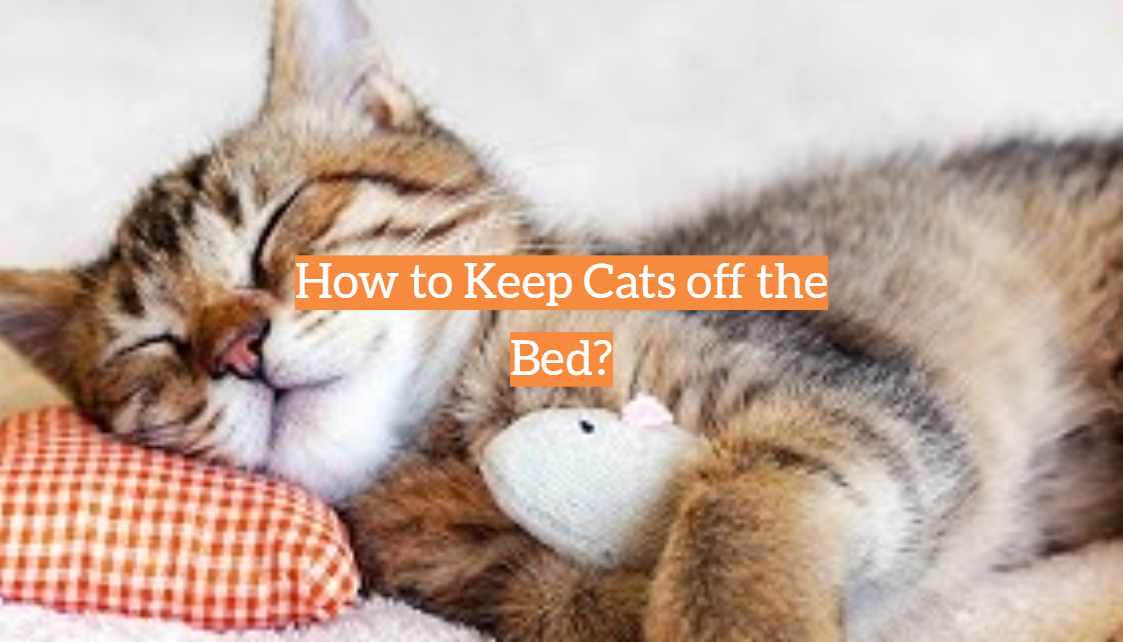For numerous cat owners, preventing their beloved feline friends from hopping onto the bed can pose a considerable challenge. Cats are naturally attracted to cozy, warm spaces, and human beds often fit this description perfectly. However, there are numerous reasons to discourage cats from this habit, including allergies, cleanliness, and sleep disruption. In this guide, we’ll explore effective strategies to keep your cat off the bed while maintaining a harmonious relationship with your furry friend.
Why Does My Cat Always Want To Sleep In The Same Bed As Me?
Cats often sleep in their human companions’ beds for security and comfort. Being near you, their trusted owner, helps them feel protected. Furthermore, the warmth from your body is also a strong allure, especially during colder seasons. Another factor is the familiar scent of their owners which cats find comforting. This behavior also has roots in their social nature. Despite their reputation for independence, cats are social creatures and sleeping together is one way they bond with members of their colony. Therefore, when your cat chooses to cuddle up with you at night, it can be a sign of trust and affection.

Why Should My Cat Not Sleep On The Bed With Me?
There are a few reasons why it’s not ideal for your cat to share the bed with you. First, cats are nocturnal by nature, and their late-night activities could disrupt your sleep schedule. Cats often wake up and move around during the night, and if they’re on your bed, this means you might get woken up too. Second, sharing a bed with a cat can exacerbate allergies, even if you’re not typically bothered during the day. The close proximity can increase exposure to allergens. Lastly, cats can bring dirt, fleas, and other parasites into your bed. While cats are generally clean animals, their outdoor adventures can lead to these unwanted guests. For these reasons, it may be best to provide your cat with its own comfortable sleeping area. [1]

How Do I Keep My Cat Off My Bed At Night?
There are multiple techniques you can utilize to prevent your feline companion from occupying your bed during the night.
Creating An Uninviting Environment
One effective strategy to discourage your cat from sleeping on your bed is to create an environment that doesn’t appeal to them. There are several ways to do this.

You can use a mattress protector or cover that is uncomfortable for the cat’s paws, such as one with a slippery surface. Cats like to grip onto surfaces when they sleep, and an unsteady surface may deter them from climbing onto your bed.
Alternatively, you could use a pet deterrent spray. These are typically made with scents that cats find unpleasant, but are not bothersome to humans. Using this spray on your bed can help deter your cat from getting on it. [2]
Natural Alternative Repellents
In addition to commercial sprays, natural alternatives can also function as effective cat repellents. Certain scents, such as citrus or coffee, are usually unpleasant to cats. You could use essential oils like lemon or orange, diluted with water, and lightly spray it on your bed. Alternatively, placing a bowl of used coffee grounds near your bed may deter your cat from approaching. Remember, these substances should only be used in a way that allows the cat to avoid them freely. Excessive use of these scents or forcing exposure can cause distress to your cat. Always consult your vet before using any new substances around your pet.

Positive Reinforcement
Positive reinforcement effectively trains cats to stay off the bed humanely. This entails offering your cat a reward when they display the desired behavior, which in this instance is sleeping in their designated bed. Start by providing your cat with a comfortable, warm, and inviting sleeping area. You can use things like heated pet beds, cozy blankets, or even a piece of your worn clothing that carries your scent – cats find this comforting.
It’s important to be patient and consistent during this process; remember, it takes time to change a habit. Also, never resort to harsh punishment or yelling if your cat slips up and returns to your bed. This will only create fear and confusion. Positive reinforcement is all about encouraging good behavior through rewards, not punishing for mistakes. [3]
Provide A Cat Bed
Providing your cat with its own bed is a crucial step in keeping them off yours. Cats are naturally inclined to seek out warm, comfortable spaces for rest, so make sure their designated sleeping area is cozy and inviting. Start by choosing a cat bed that is the right size, ideally with raised edges for your cat to lean against. The cat bed’s location is important. It should be in a quiet, safe space away from high traffic areas in your home. You might consider adding a familiar blanket or piece of your clothing to the cat bed, as your scent can provide comfort and security to your cat. If the weather is cold, consider investing in a heated cat bed or adding a heat pad to their regular bed. Remember to reward your cat for using their bed to reinforce the behavior. Over time, the cat will start associating their bed with comfort and security, which could make it easier for them to stay off yours. [4]
How Do I Stop My Cat From Jumping On The Bed?
To stop your cat from jumping on the bed, ensure they have ample playtime during the day. Cats are naturally energetic creatures and jump on furniture as part of their play. Hence, by exhausting their energy through play, they are less likely to jump on the bed. Use toys, like feather wands or laser pointers, that encourage jumping and chasing to help them expend energy.

In addition, you can also train your cat to understand the command “off”. When your cat jumps on the bed, gently pick them up and say “off”, then place them on the ground. Repeat this process consistently until your cat starts to associate the word “off” with the action of not being on the bed. Remember, never yell or punish your cat as it can cause stress and confusion.
Another method is to use a cat deterrent spray on your bed. The smell is typically unpleasant to cats and may deter them from jumping on to the bed. You can also consider installing a pet gate to block off access to the bedroom. [5]
FAQ
How do you get a cat to sleep in its own bed?
To get a cat to sleep in its own bed, make the bed cozy and inviting. Use a soft, warm blanket and consider adding a piece of your clothing for your scent, which can help the cat feel safe and secure. Place the cat bed in a quiet, low-traffic area where your cat likes to spend time.
Next, introduce your cat to the new bed. This can be done by placing them in the bed and giving them treats or praises when they stay. If your cat leaves, don’t force them to stay. Instead, let them get used to the bed at their own pace.
Using positive reinforcement techniques can also help. When you see your cat using their bed, reward them with treats, praises, or affection. This helps your cat associate the bed with positive experiences.
How do I get my cat to stop waking me up at 4am?
Cats can disrupt your sleep by waking you up early, driven by their hunting instincts or desire for attention. Follow these steps to help modify this behavior:
- Maintain a consistent feeding schedule: Cats often wake up their owners due to hunger. To help your cat sleep well at night, offer them a small meal before bedtime. This can keep them content and restful throughout the night.
- Engage in evening play sessions: Like humans, cats need to burn off energy to sleep well. Play with your cat in the evening to tire them out and encourage more nighttime sleep.
- Ignore the behavior: If your cat wakes you up, don’t engage with them. Attention, even negative, can reinforce the behavior. It might be hard initially, but your cat should eventually understand that the actions don’t result in attention.
- Create a comfortable sleeping space: Make sure your cat’s bed is warm and cozy. This can encourage them to sleep there instead of disrupting your rest.
- Consult a veterinarian: If the issue continues, it could be due to a medical issue. Cats can experience changes in their sleep patterns due to various health problems such as hyperthyroidism or arthritis. You should consult with your veterinarian to rule out any health issues.
Remember, it’s important to stay consistent and patient. Changes in behavior take time and your cat needs to adjust to the new routine.
Why does my cat keep laying on my bed?
Your cat may prefer your bed over their own for several reasons. Firstly, cats are drawn to warmth and your bed, especially when you’re in it, provides a cozy and warm space for them to relax. Secondly, your cat may like your scent which provides them with a sense of safety and comfort. Additionally, if they are left alone during the day, they may choose to sleep on your bed as a way of bonding or being close to you. Lastly, cats are territorial creatures. If your cat constantly sleeps on your bed, it may be their way of marking their territory. Remember, if you want your cat to stop sleeping on your bed, you should never punish them. Instead, provide them with a comfortable alternative and positively reinforce their use of it.
Can I interrupt my cats sleep?
Yes, you can interrupt your cat’s sleep but it is not recommended unless it’s necessary. Cats sleep for an average of 13 to 14 hours a day, and this sleep is crucial for their health and wellbeing. If you frequently disturb your cat’s sleep, it can cause them stress and affect their overall health. If it’s necessary to wake your cat – for example, for a vet appointment – do it gently. You can softly call their name or lightly stroke their body. Remember, never shake or shock them awake as it can cause them unnecessary stress. It’s always best to let sleeping cats lie. If your cat is sleeping in an inconvenient place, try to create a comfortable and inviting sleeping spot for them elsewhere to encourage them to relocate.
What scents bother cats?
Cats have an exceptional sense of smell, surpassing that of humans. Certain scents can be bothersome and even harmful to cats. Some of these odors include citrus fruits (lemon, lime, and orange), aromatic herbs (rosemary, thyme, and lavender), chemical and cleaning smells (bleach, ammonia, and detergents), and certain essential oils (eucalyptus, tea tree, and peppermint). Other potentially bothersome smells for cats include the odor of some indoor plants, such as lilies and poinsettias, and certain spices, like cinnamon and chili powder. Remember, these scents can strategically deter cats from specific areas.
Why won’t my cat let me sleep in?
Cats may disrupt your sleep for a variety of reasons. Predominantly being crepuscular animals, cats are most active during dawn and dusk, which can often coincide with your sleeping hours. Additionally, they may be seeking attention or food. If your cat is used to being fed early in the morning, they may wake you up for their meal. Also, if you engage with them when they wake you up, they might see this as a form of attention, reinforcing the behavior.
To curb this, you can try feeding your cat later in the evening or using an automatic feeder set to a specific time in the morning, so they do not associate you waking up with their feeding time. Ignoring their attempts to wake you up can also help, though it may be difficult initially. Ensure they have a comfortable place to sleep and plenty of activities to keep them engaged. If the behavior continues, consult a veterinarian to rule out any underlying health issues that may be causing it.
Why can’t my cat sleep alone?
Cats sometimes struggle to sleep alone due to several reasons. Predominantly, cats are social animals and may feel safer or more comfortable when sleeping near their human caregivers. This behavior can be traced back to their ancestors who slept in packs for protection. Though domesticated, some cats may still carry this instinct. Separation anxiety could also be a reason, especially if the cat has a strong bond with you. They may associate your presence with safety and comfort, and consequently feel anxious when left alone. In some cases, it could also be due to illness or discomfort. If your cat is experiencing difficulty sleeping alone all of a sudden, it may be advisable to seek advice from a veterinarian to rule out any potential health concerns. Regardless, it is important to create a comfortable and inviting sleep environment for your cat, equipped with a warm bed and their favorite toys. This will encourage them to sleep on their own, ensuring both of you get a good night’s sleep.
How to educate your cat?
Educating your cat involves teaching them acceptable behaviors while deterring the undesirable ones. Here are a few steps you can follow:
- Positive Reinforcement
- Clicker Training
- Ignore Bad Behavior
- Introduce Changes Gradually
- Consult a Professional
Keep in mind that patience is crucial when it comes to educating your feline companion. It might take time for your cat to learn and it’s important to be consistent with your training.
Can I train my cat not to wake me up?
You can train your cat to avoid waking you up. It may require some patience and consistency, but it’s entirely possible. Here are some steps you can follow:
- Establish a Routine
- Ignore Wake-Up Attempts
- Set Up an Automatic Feeder
- Provide a Comfortable Sleeping Space
- Gradual Training
- Consult a Veterinarian or Cat Behaviorist
Remember, each cat is unique, and what works for one may not work for another. Tailor these strategies to fit your cat’s specific needs and personality. With patience and consistency, you can train your cat not to wake you up.
How do you train a cat not to wake up?
To prevent your cat from waking you up, start by understanding their behavior and motives. Here are a few steps you can follow:
- Establish a Routine
- Play Before Bedtime
- Avoid Feeding Immediately After Waking Up
- Ignore Early Morning Meowing
- Provide a Comfortable Sleeping Space
- Consult a Professional
Remember, patience and consistency are key. Cats need time to adapt to new routines and behaviors.
Useful Video: How To Keep Cat Off Bed
Conclusion
Keeping cats off your bed and ensuring they don’t wake you up can be challenging, but it’s certainly achievable with patience and consistency. Every cat is unique. Tailoring strategies to your feline friend’s needs and personality can yield successful results. Establishing routines, providing a comfortable independent sleeping space, and using positive reinforcement can go a long way in influencing your cat’s behavior. Remember, if you’re struggling, professional help is always available.
References:
- https://catsaway.org/keep-cat-off-bed/#:~:text=Deterrents%20such%20as%20double%2Dsided,their%20way%20past%20your%20deterrents.
- https://livelongandpawspurr.com/blog/10-simple-tricks-to-keep-your-cat-off-your-bed/
- https://betterwithcats.net/how-to-keep-your-cat-off-the-bed/
- https://upgradeyourcat.com/how-to-keep-your-cat-off-the-bed-night-day/
- https://catanddoghouse.com/how-to-keep-cats-off-bed/










Leave a Reply